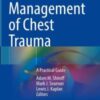Heterogeneity in Pediatric ARDS: Challenges and Complexities in Diagnosis and Treatment
thelancet.comPediatric intensive care physicians are well-acquainted with the concept of heterogeneity, as the patients, pathologies, and treatments they encounter can vary greatly both within the pediatric intensive care unit and within a specific disease process.
Pediatric acute respiratory distress syndrome (ARDS) is a prime example of this complexity. Children with ARDS can vary in age, underlying cause, pre-existing comorbidities, and immune status.
Additionally, there is not a single pathway by which ARDS develops or presents, as evidenced by the identification of hyperinflammatory and hypoinflammatory subtypes in adults and children.
Additionally, the effectiveness of treatments can vary widely, with some interventions being beneficial for some patients but harmful for others, resulting in a population-wide average treatment effect that is not statistically significant.

















